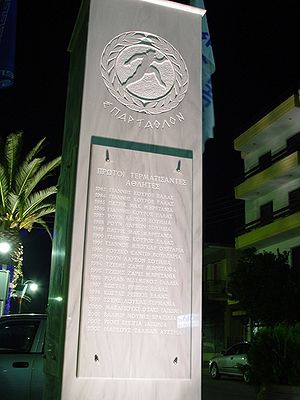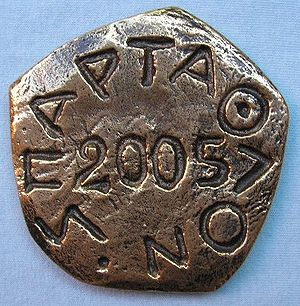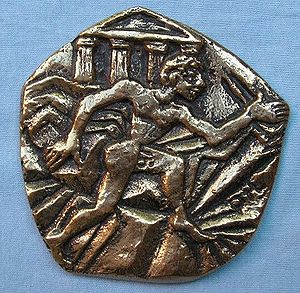
Spartathlon
Encyclopedia



Ultramarathon
An ultramarathon is any sporting event involving running longer than the traditional marathon length of .There are two types of ultramarathon events: those that cover a specified distance, and events that take place during specified time...
race held annually in Greece
Greece
Greece , officially the Hellenic Republic , and historically Hellas or the Republic of Greece in English, is a country in southeastern Europe....
since 1983 between Athens and Sparta
Sparta
Sparta or Lacedaemon, was a prominent city-state in ancient Greece, situated on the banks of the River Eurotas in Laconia, in south-eastern Peloponnese. It emerged as a political entity around the 10th century BC, when the invading Dorians subjugated the local, non-Dorian population. From c...
.
Origin
The Spartathlon aims to trace the footsteps of PheidippidesPheidippides
Pheidippides , hero of Ancient Greece, is the central figure in a story which was the inspiration for a modern sporting event, the marathon.-The story:...
, an Athenian messenger sent to Sparta in 490 BC to seek help against the Persians in the Battle of Marathon
Battle of Marathon
The Battle of Marathon took place in 490 BC, during the first Persian invasion of Greece. It was fought between the citizens of Athens, aided by Plataea, and a Persian force commanded by Datis and Artaphernes. It was the culmination of the first attempt by Persia, under King Darius I, to subjugate...
. Pheidippides, according to an account by Greek historian Herodotus
Herodotus
Herodotus was an ancient Greek historian who was born in Halicarnassus, Caria and lived in the 5th century BC . He has been called the "Father of History", and was the first historian known to collect his materials systematically, test their accuracy to a certain extent and arrange them in a...
in The Persian Wars, arrived in Sparta the day after he departed. Herodotus wrote: "On the occasion of which we speak when Pheidippides was sent by the Athenian generals, and, according to his own account, saw Pan on his journey, he reached Sparta on the very next day after quitting the city of Athens." . Based on this account, British RAF Wing Commander John Foden and four other RAF officers travelled to Greece in 1982 on an official expedition to test whether it was possible to cover the nearly 250 kilometres in a day and a half. Three runners were successful in completing the distance: John Foden (37:37), John Scholtens (34:30) and John McCarthy in (39:00). In the following year a team of enthusiastic supporters (British, Greek and other nationalities) based on the British Hellenic Chamber of Commerce in Athens and led by Philhellene Michael Callaghan organised the running of the first Open International Spartathlon Race. The event was run under the auspices of SEGAS, the Hellenic Amateur Athletics Association.
The race
The race starts at 7:00 am, usually on the last Friday each September, at the foot of the Acropolis. It runs out of Athens toward the coast and runs along the coast towards Corinth via Elefsis, Megara, and Kineta. The route reaches the Corinth Canal at 78.5 kilometres and the runners hit the first of six major check points at 81 kilometres.After Corinth, the race heads toward Ancient Corinth, Nemea, Lyrkia and at 159 kilometres, reaches the top of Mount Parthenio. From there, it continues south toward Nestani and Tegea, before reaching the main Sparta highway just before the 200 kilometer mark.
Runners must pass through 75 checkpoints along the way and each checkpoint has a cut-off time. Runners outside the cut-off may be pulled out of the race although tardiness in the first half of the race is generally tolerated. This tolerance begins to fade after sunset and in the last third of the race, organisers may pull out runners who are either outside the time limit or who display extreme fatigue.
Entry requirements
In order to run in this race an individual must meet at least one of the following requirements:- The individual has finished a race of at least 100 km (62.1 mi) in less than 10 hours, 30 minutes.
- The individual has competed in an event of more than 200 kilometres (124.3 mi) and has completed the race.
- The individual has already competed in Spartathlon and has reached the checkpoint "NestaniNestaniNestani is a small village around 15km from Tripoli in the Peloponnese, Greece. It is part of the municipal unit Mantineia. The municipal district Nestani also contains the village of Milea....
" (172 km) in less than 24 hours, 30 minutes.
Records
Yiannis KourosYiannis Kouros
Yiannis Kouros is a Greek ultramarathon runner based in Melbourne. He is sometimes called the "Running God" or the "Pheidippides Successor". He holds every men's outdoor road world record from 100 to 1,000 miles and every road and track record from 12 hours to 6 days...
, who won the first Spartathlon, still holds the record time at 20:25:00. Kouros competed in four Spartathlons, won all four and holds the four fastest times ever recorded. In 2005, he decided to trace the steps of Pheidippides completely and ran - out of competition - the Athens-Sparta-Athens distance.
In 2008, Scott Jurek
Scott Jurek
Scott Gordon Jurek is an American ultramarathoner. Throughout Jurek's career he has been one of the most dominant ultramarathon runners in the world, winning many of the sport's most prestigious races multiple times, including the Hardrock Hundred , the Badwater Ultramarathon , the Spartathlon ,...
won his third straight title, clocking the fifth fastest time in the history of the race. Only Kouros (four times) has run the course faster than Jurek.
In 2007, the 25th anniversary competition had a record 323 starters and the 2008 race had a record 151 finishers under the 36 hour cut-off time.
Following are the winners of the Spartathlon
Men
| Year | Athlete | Country | Time (hours:minutes:seconds) |
|---|---|---|---|
| 2011 | Ivan Cudin | 22:57:40 | |
| 2010 | Ivan Cudin | 23:03:06 | |
| 2009 | Ryoichi Sekiya | 23:48:24 | |
| 2008 | Scott Jurek Scott Jurek Scott Gordon Jurek is an American ultramarathoner. Throughout Jurek's career he has been one of the most dominant ultramarathon runners in the world, winning many of the sport's most prestigious races multiple times, including the Hardrock Hundred , the Badwater Ultramarathon , the Spartathlon ,... |
22:20:01 | |
| 2007 | Scott Jurek Scott Jurek Scott Gordon Jurek is an American ultramarathoner. Throughout Jurek's career he has been one of the most dominant ultramarathon runners in the world, winning many of the sport's most prestigious races multiple times, including the Hardrock Hundred , the Badwater Ultramarathon , the Spartathlon ,... |
23:12:14 | |
| 2006 | Scott Jurek Scott Jurek Scott Gordon Jurek is an American ultramarathoner. Throughout Jurek's career he has been one of the most dominant ultramarathon runners in the world, winning many of the sport's most prestigious races multiple times, including the Hardrock Hundred , the Badwater Ultramarathon , the Spartathlon ,... |
22:52:18 | |
| 2005 | Jens Lukas | 24:20:39 | |
| 2004 | Jens Lukas | 25:49:59 | |
| 2003 | Markus Thalmann | 23:28:24 | |
| 2002 | Ryōichi Sekiya | 23:47:54 | |
| 2001 | Valmir Nunes Valmir Nunes Valmir Nunes is a Brazilian runner. A former world record holder, he currently holds South American and Brazilian Ultramarathon records.-Career:... |
23:18:05 | |
| 2000 | Masayuki Ōtaki | 24:01:10 | |
| 1999 | Jens Lukas | 25:38:03 | |
| 1998 | Kostas Reppos | 25:11:41 | |
| 1997 | Kostas Reppos | 23:37:00 | |
| 1996 | Roland Vuillemenot | 26:21:00 | |
| 1995 | James Zarei | 25:59:42 | |
| 1994 | James Zarei | 26:15:00 | |
| 1993 | Rune Larsson | 25:57:12 | |
| 1992 | Rusko Kantiev | 24:15:31 | |
| 1991 | János Bogár | 24:15:31 | |
| 1990 | Yiannis Kouros Yiannis Kouros Yiannis Kouros is a Greek ultramarathon runner based in Melbourne. He is sometimes called the "Running God" or the "Pheidippides Successor". He holds every men's outdoor road world record from 100 to 1,000 miles and every road and track record from 12 hours to 6 days... |
20:29:00 | |
| 1989 | Patrick Macke | 24:32:00 | |
| 1988 | Rune Larsson | 24:42:00 | |
| 1987 | Rune Larsson | 24:41:00 | |
| 1986 | Yiannis Kouros Yiannis Kouros Yiannis Kouros is a Greek ultramarathon runner based in Melbourne. He is sometimes called the "Running God" or the "Pheidippides Successor". He holds every men's outdoor road world record from 100 to 1,000 miles and every road and track record from 12 hours to 6 days... |
21:57:00 | |
| 1985 | Patrick Macke | 23:18:00 | |
| 1984 | Yiannis Kouros Yiannis Kouros Yiannis Kouros is a Greek ultramarathon runner based in Melbourne. He is sometimes called the "Running God" or the "Pheidippides Successor". He holds every men's outdoor road world record from 100 to 1,000 miles and every road and track record from 12 hours to 6 days... |
20:25:00 | |
| 1983 | Yiannis Kouros Yiannis Kouros Yiannis Kouros is a Greek ultramarathon runner based in Melbourne. He is sometimes called the "Running God" or the "Pheidippides Successor". He holds every men's outdoor road world record from 100 to 1,000 miles and every road and track record from 12 hours to 6 days... |
21:53:00 |
Women
| Year | Athlete | Country | Time |
|---|---|---|---|
| 2011 | Szilvia Lubics | 29:07:39 | |
| 2010 | Emily Gelder | 30:17:03 | |
| 2009 | Sumie Inagaki | 27:39:49 | |
| 2008 | Sook-Hue Hur | 30:03:22 | |
| 2007 | Akiko Sakamoto | 31:09:24 | |
| 2006 | Sumie Inagaki | 28:37:20 | |
| 2005 | Kimie Noto | 30:23:07 | |
| 2004 | Kimie Noto | 29:57:40 | |
| 2003 | Akiko Sakamoto | 29:07:44 | |
| 2002 | Irina Reutovich | 28:10:48 | |
| 2001 | Alzira Portela-Lario | 30:31:41 | |
| 2000 | Hiroko Okiyama | 29:16:37 | |
| 1999 | Anny Monot | 35:38:08 | |
| 1998 | Mary Larsson | 28:46.58 | |
| 1997 | Helga Backhaus | 30:39 | |
| 1996 | Helga Backhaus | 29:50 | |
| 1995 | Helga Backhaus | 29:33 | |
| 1994 | Helga Backhaus | 30:41 | |
| 1993 | Sigrid Lomsky | 32:43:32 | |
| 1992 | Hilary Walker | 29:49:49 | |
| 1991 | Ursula Blasberg | 34:42:45 | |
| 1990 | Anne-Marie Deguilhem | 34:07:41 | |
| 1989 | Mary Hanudel (later Mary Larsson) | 31:57:23 | |
| 1988 | – | ||
| 1987 | Hilary Walker | 31:23:30 | |
| 1986 | Waltraud Reisert | 32:21 | |
| 1985 | Mary Hanudel (later Mary Larsson) | 34:10 | |
| 1984 | Mary Hanudel (later Mary Larsson) Lorna Richey (later Lorna Michael) |
|
34:15:10 |
| 1983 | Eleanor Adams | 32:37:52 | |
All-time top 50 performances
| Athlete | Time | Country | Year | Place | Age | |
|---|---|---|---|---|---|---|
| 1. | Yiannis Kouros | 20:25:00 | GRE | 1984 | 1 | 28 |
| 2. | Yiannis Kouros | 20:29:04 | GRE | 1990 | 1 | 34 |
| 3. | Yiannis Kouros | 21:53:42 | GRE | 1983 | 1 | 27 |
| 4. | Yiannis Kouros | 21:57:00 | GRE | 1986 | 1 | 30 |
| 5. | Scott Jurek | 22:20:01 | USA | 2008 | 1 | 34 |
| 6. | Scott Jurek | 22:52:18 | USA | 2006 | 1 | 32 |
| 7. | Ivan Cudin | 22:57:40 | ITA | 2011 | 1 | 36 |
| 8. | Ivan Cudin | 23:03:06 | ITA | 2010 | 1 | 35 |
| 9. | Patrik Macke | 23:08:41 | GBR | 1990 | 2 | 35 |
| 10. | Scott Jurek | 23:12:14 | USA | 2007 | 1 | 33 |
| 11. | Patrik Macke | 23:18:00 | GBR | 1985 | 1 | 30 |
| 12. | Valmir Nunes | 23:18:05 | BRA | 2001 | 1 | 37 |
| 13. | Markus Thalmann | 23:28:24 | AUT | 2003 | 1 | 39 |
| 14. | Jan Lantink | 23:31:22 | HOL | 2010 | 2 | 52 |
| 15. | Kostas Reppos | 23:37:00 | GRE | 1997 | 1 | 31 |
| 16. | Dusan Mravlje | 23:44:00 | YUG | 1985 | 2 | 32 |
| 17. | Riochy Sekiya | 23:47:54 | JPN | 2002 | 1 | 35 |
| 18. | Riochy Sekiya | 23:48:24 | JPN | 2009 | 1 | 42 |
| 19. | Ohtaki Masayuki | 24:01:10 | JPN | 2000 | 1 | 34 |
| 20. | Rusko Kantief | 24:08:13 | BUL | 1992 | 1 | 34 |
| 21. | Ryoichi Sekiya | 24:14:11 | JPN | 2006 | 2 | 39 |
| 22. | János Bogár | 24:15:31 | HUN | 1991 | 1 | 27 |
| 23. | Jens Lukas | 24:20:39 | GER | 2005 | 1 | 39 |
| 24. | Piotr Kurylo | 24:29:41 | POL | 2007 | 2 | 35 |
| 25. | Lars Christoffers | 24:31:45 | DEN | 2009 | 2 | 37 |
| 26. | Patrik Macke | 24:32:05 | GBR | 1989 | 1 | 34 |
| 27. | Dusan Mravlje | 24:39:22 | YUG | 1983 | 2 | 30 |
| 28. | Dusan Mravlje | 24:40:38 | YUG | 1984 | 2 | 31 |
| 29. | Rune Larsson | 24:41:46 | SWE | 1987 | 1 | 31 |
| 30. | Jean-Dominique Calbera | 24:42:00 | FRA | 1985 | 3 | 37 |
| 31. | Rune Larsson | 24:42:05 | SWE | 1988 | 1 | 32 |
| 32. | Jens Lukas | 24:46:51 | GER | 2001 | 2 | 35 |
| 33. | János Bogár | 24:49:19 | HUN | 1990 | 3 | 26 |
| 34. | Marcus Thalmann | 24:52:09 | AUT | 2008 | 2 | 44 |
| 35. | Jan Prockaska | 24:55:58 | GER | 2010 | 3 | 44 |
| 36. | Jens Lukas | 24:59:54 | GER | 2000 | 2 | 34 |
| 37. | Jean-Jacques Moros | 25:03:30 | FRA | 2005 | 2 | 35 |
| 38. | Paul Beckers | 25:05:48 | BEL | 1992 | 2 | 30 |
| 39. | Jon Berge | 25:09:38 | NOR | 2009 | 3 | 40 |
| 40. | Kostas Reppos | 25:11:41 | GRE | 1998 | 1 | 32 |
| 41. | Markus Thalmann | 25:16:56 | AUT | 2002 | 2 | 38 |
| 42. | Masayuki Ohtaki | 25:19:12 | JPN | 2006 | 3 | 40 |
| 43. | Ryoichi Sekiya | 25:27:30 | JPN | 2001 | 3 | 34 |
| 44. | Rune Larsson | 25:28:48 | SWE | 1989 | 2 | 33 |
| 45. | Lars Skytte Christoffersen | 25:29:41 | DEN | 2008 | 3 | 36 |
| 46. | Valmir Nunes | 25:30:35 | BRA | 2003 | 2 | 39 |
| 47. | Rune Larsson | 25:32:55 | SWE | 1990 | 4 | 34 |
| 48. | Akihiko Kumasaka | 25:34:49 | JAP | 2001 | 4 | 33 |
| 49. | Verhagen Gees | 25:35:50 | HOL | 2000 | 3 | 40 |
| 50. | Valmir Nunes | 25:37:40 | BRA | 2007 | 2 | 43 |

